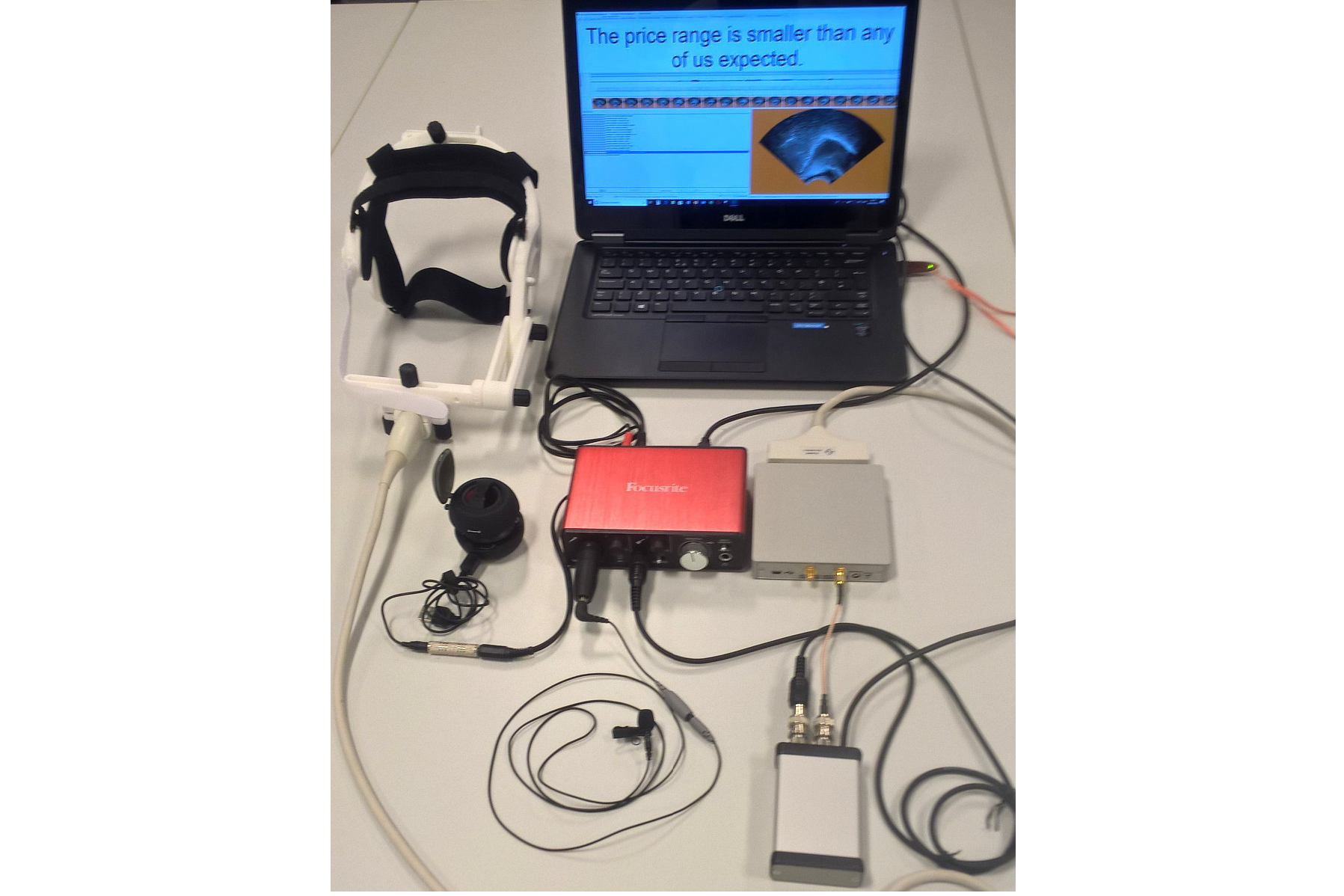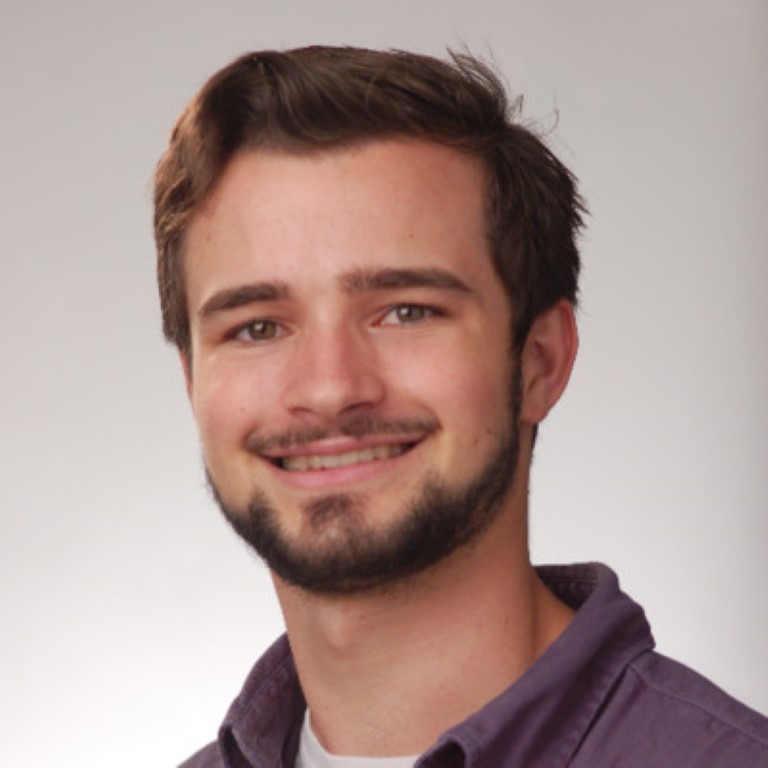About
The Cornell Phonetics Lab is a group of students and faculty who are curious about speech. We study patterns in speech — in both movement and sound. We do a variety research — experiments, fieldwork, and corpus studies. We test theories and build models of the mechanisms that create patterns. Learn more about our Research. See below for information on our events and our facilities.

Upcoming Events

8th March 2024 11:00 AM
Special Event: Dr. Matt Faytak will demonstrate ultrasonic monitoring of speech articulation!
Dr. Matt Faytak (U. of Buffalo) is visiting Cornell this week as our Linguistics Colloquium speaker, and as part of his visit he will demonstrate ultrasonic monitoring of speech articulation with the Articulate Instruments Micro Speech Research Ultrasound System.
Note that we will soon add our own Articulate Instruments system to the Phonetics Lab Sound Booth, so this demo is highly relevant to students interested in phonetics and phonology!
Location: B11 Morrill Hall, 159 Central Avenue, Morrill Hall, Ithaca, NY 14853-4701, USA
9th March 2024 09:00 AM
First annual meeting of PHUNY (Phonetics/Phonology in Upstate NY)
PHUNY is a free workshop for graduate students in Central/Upstate NY working on any aspect of phonetics and/or phonology. It is a small and friendly conference-style meeting with a single-stream, one-day format.
Our goal is to build community and provide a venue for practicing conference skills. All graduate students and faculty are encouraged to attend.
Visit the PHUNY conference site to register and see the day's schedule and titles of talks and posters.
Location: 106 Morrill Hall, Cornell University Dept, 159 Central Avenue, Morrill Hall, Ithaca, NY 14853-4701, USA11th March 2024 12:20 PM
Phonetics Lab Meeting
There is no phonetics lab meeting this week.
Location: B11 Morrill Hall, 159 Central Avenue, Morrill Hall, Ithaca, NY 14853-4701, USA
12th March 2024 04:30 PM
Linguistics Colloquium and ASL Linguistics Lecture Series Speaker: Gideon Firl
The Cornell Linguistics Department proudly presents Linguistics Colloquium and ASL Linguistics Lecture Series Speaker Gideon Firl - a Fulbright Scholar who is researching Indian deaf culture at the United States-India Education l Foundation (USIEF), New Delhi.
Gideon will present a talk titled: Deaf Perspective: Exploring the Essence of Indian Sign Language
ASL/English interpretation will be provided, and a light reception with the speaker will follow in the Linguistics Lounge.
Abstract:
Gideon set out to explore the questions: Is sign language helpful to Deaf people's life quality in India? What is the essence of Indian sign language?
He discovered that having sign language is key to Deaf success in their ability to contribute to the neighboring world.
This presentation will be a narrative of Gideon's time in India. Key points in this presentation are: Deaf identity, artistic expression, and resigned discrimination.
In the end, he learned that there are so much more to do in India in relation to advocating for Deaf rights, but his main focus is on theater arts and preserving Deaf stories.
Bio:
Gideon comes from a multigenerational deaf family that uses ASL. He is a Gallaudet alumnus, with a bachelor's degree in Biology. Gideon and his wife has returned from their 9 months stay in India for Gideon's Fulbright study on the essence of Indian sign language.
Before his Fulbright study, he worked as a translator, actor, writer, videographer, editor, and director for several organizations such as Pioneer Bible Translators, Deaf Documentary Center, and Deaf Health Equity. He also just completed a project with Deaf Missions, producing a groundbreaking film on Jesus. He currently resides in Albany, NY with his wife and dog.
Location: 106 Morrill Hall, 159 Central Avenue, Morrill Hall, Ithaca, NY 14853-4701, USA
Facilities
The Cornell Phonetics Laboratory (CPL) provides an integrated environment for the experimental study of speech and language, including its production, perception, and acquisition.
Located in Morrill Hall, the laboratory consists of six adjacent rooms and covers about 1,600 square feet. Its facilities include a variety of hardware and software for analyzing and editing speech, for running experiments, for synthesizing speech, and for developing and testing phonetic, phonological, and psycholinguistic models.
Web-Based Phonetics and Phonology Experiments with LabVanced
The Phonetics Lab licenses the LabVanced software for designing and conducting web-based experiments.
Labvanced has particular value for phonetics and phonology experiments because of its:
- *Flexible audio/video recording capabilities and online eye-tracking.
- *Presentation of any kind of stimuli, including audio and video
- *Highly accurate response time measurement
- *Researchers can interactively build experiments with LabVanced's graphical task builder, without having to write any code.
Students and Faculty are currently using LabVanced to design web experiments involving eye-tracking, audio recording, and perception studies.
Subjects are recruited via several online systems:
- * Prolific and Amazon Mechanical Turk - subjects for web-based experiments.
- * Sona Systems - Cornell subjects for for LabVanced experiments conducted in the Phonetics Lab's Sound Booth

Computing Resources
The Phonetics Lab maintains two Linux servers that are located in the Rhodes Hall server farm:
- Lingual - This Ubuntu Linux web server hosts the Phonetics Lab Drupal websites, along with a number of event and faculty/grad student HTML/CSS websites.
- Uvular - This Ubuntu Linux dual-processor, 24-core, two GPU server is the computational workhorse for the Phonetics lab, and is primarily used for deep-learning projects.
In addition to the Phonetics Lab servers, students can request access to additional computing resources of the Computational Linguistics lab:
- *Badjak - a Linux GPU-based compute server with eight NVIDIA GeForce RTX 2080Ti GPUs
- *Compute server #2 - a Linux GPU-based compute server with eight NVIDIA A5000 GPUs
- *Oelek - a Linux NFS storage server that supports Badjak.
These servers, in turn, are nodes in the G2 Computing Cluster, which currently consists of 195 servers (82 CPU-only servers and 113 GPU servers) consisting of ~7400 CPU cores and 698 GPUs.
The G2 Cluster uses the SLURM Workload Manager for submitting batch jobs that can run on any available server or GPU on any cluster node.
Articulate Instruments - Micro Speech Research Ultrasound System
We use this Articulate Instruments Micro Speech Research Ultrasound System to investigate how fine-grained variation in speech articulation connects to phonological structure.
The ultrasound system is portable and non-invasive, making it ideal for collecting articulatory data in the field.

BIOPAC MP-160 System
The Sound Booth Laboratory has a BIOPAC MP-160 system for physiological data collection. This system supports two BIOPAC Respiratory Effort Transducers and their associated interface modules.

Language Corpora
- The Cornell Linguistics Department has more than 915 language corpora from the Linguistic Data Consortium (LDC), consisting of high-quality text, audio, and video corpora in more than 60 languages. In addition, we receive three to four new language corpora per month under an LDC license maintained by the Cornell Library.
- This Linguistic Department web page lists all our holdings, as well as our licensed non-LDC corpora.
- These and other corpora are available to Cornell students, staff, faculty, post-docs, and visiting scholars for research in the broad area of "natural language processing", which of course includes all ongoing Phonetics Lab research activities.
- This Confluence wiki page - only available to Cornell faculty & students - outlines the corpora access procedures for faculty supervised research.

Speech Aerodynamics
Studies of the aerodynamics of speech production are conducted with our Glottal Enterprises oral and nasal airflow and pressure transducers.

Electroglottography
We use a Glottal Enterprises EG-2 electroglottograph for noninvasive measurement of vocal fold vibration.

Real-time vocal tract MRI
Our lab is part of the Cornell Speech Imaging Group (SIG), a cross-disciplinary team of researchers using real-time magnetic resonance imaging to study the dynamics of speech articulation.

Articulatory movement tracking
We use the Northern Digital Inc. Wave motion-capture system to study speech articulatory patterns and motor control.
Sound Booth
Our isolated sound recording booth serves a range of purposes--from basic recording to perceptual, psycholinguistic, and ultrasonic experimentation.
We also have the necessary software and audio interfaces to perform low latency real-time auditory feedback experiments via MATLAB and Audapter.

